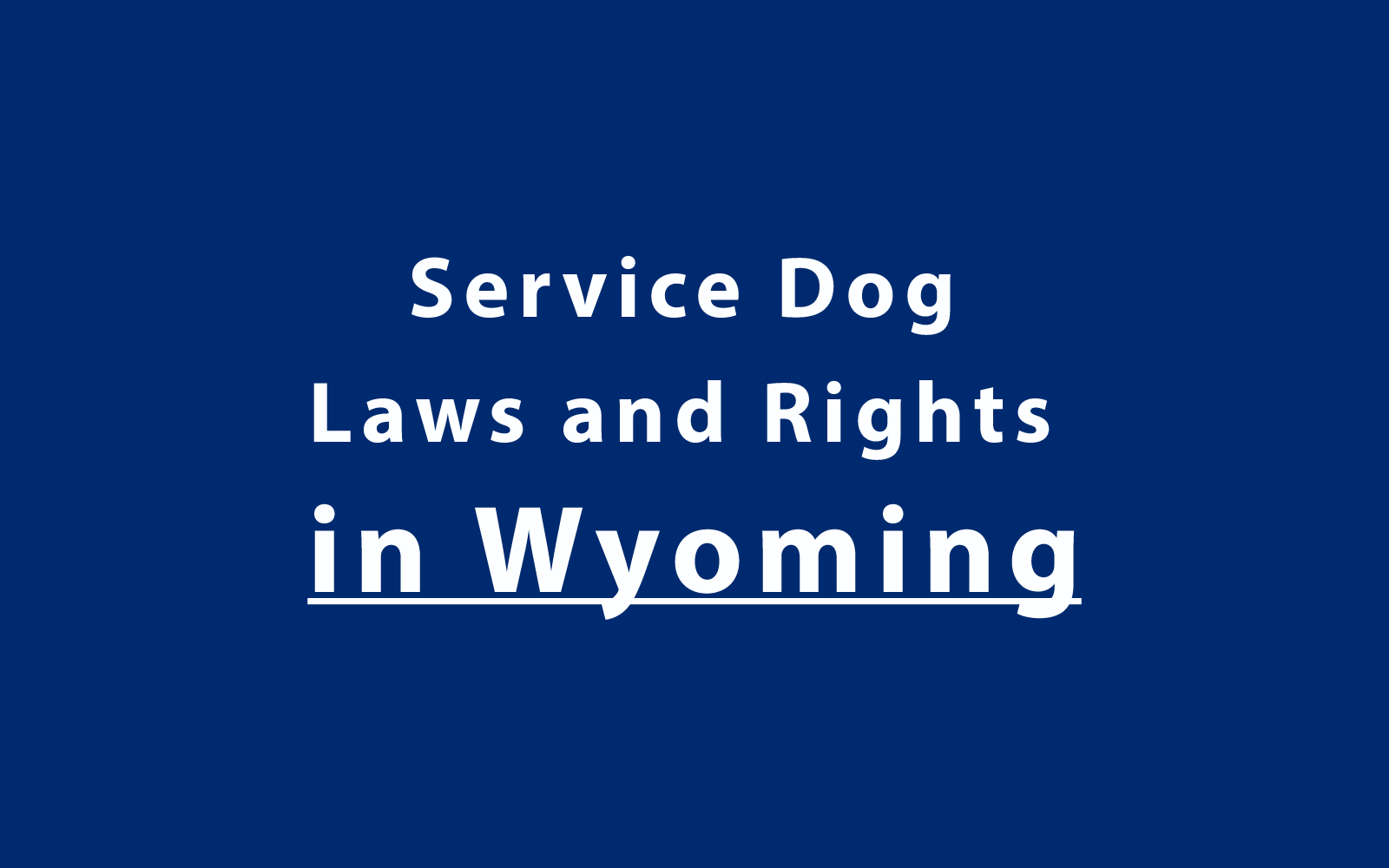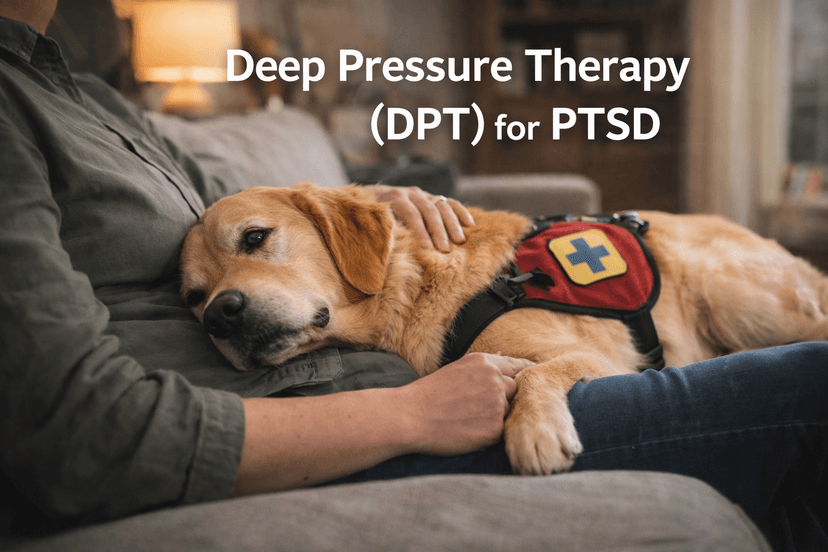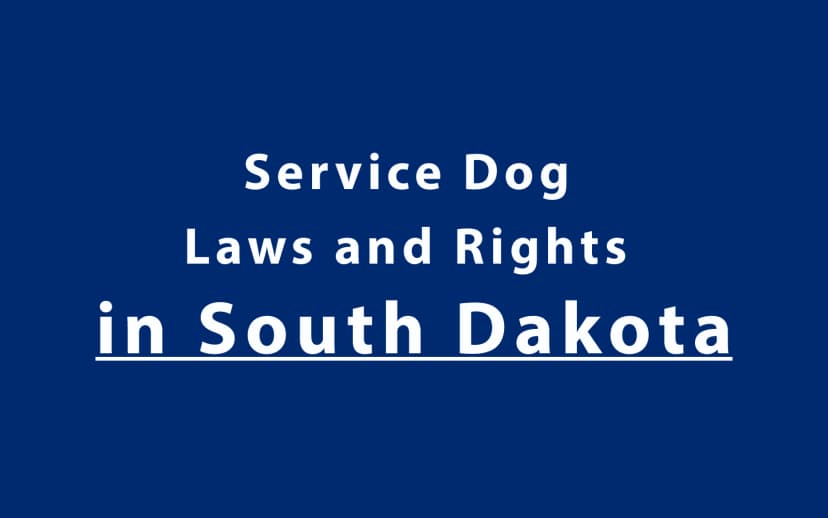Service Dog Laws and Rights in Wyoming

Service dogs are more than pets—they are vital aids that help individuals with disabilities navigate daily life. Wyoming residents who rely on service dogs are protected under both federal and state laws, ensuring they can live, work, travel, and access public spaces with dignity and independence. This guide explains the legal rights and responsibilities of service dog handlers in Wyoming.
Definition of a Service Dog in Wyoming
Under the Americans with Disabilities Act (ADA) and Wyoming Statute § 35-13-201, a service animal is defined as a dog trained to perform specific tasks directly related to a person’s disability.
Examples of tasks include:
• Guiding individuals who are blind
• Alerting those who are deaf or hard of hearing
• Providing mobility support
• Alerting to oncoming seizures
• Providing psychiatric support such as interrupting panic attacks or retrieving medication
Important distinctions:
• Emotional Support Animals (ESAs) are not considered service animals under the ADA or Wyoming law.
• Only dogs qualify under the ADA; miniature horses may be allowed in limited cases, but Wyoming law typically aligns with the federal definition.
Public Access Rights in Wyoming
The ADA and Wyoming laws protect the right of service dog teams to access all public spaces. This includes:
• Restaurants and cafes
• Grocery and retail stores
• Hotels and motels
• Government buildings
• Hospitals and clinics
• Public transportation
• Theaters, parks, and libraries
Business owners and staff are permitted to ask only two questions:
1. Is the dog a service animal required because of a disability?
2. What work or task has the dog been trained to perform?
They may not:
• Ask for medical documentation
• Demand certification or identification
• Require the dog to perform its task as a demonstration
Handlers must ensure:
• The dog is under control at all times, by leash, harness, or voice command
• The dog is housebroken and does not display aggressive or disruptive behavior
Businesses can legally exclude a service dog if it is out of control or poses a direct threat to health or safety.
Housing Rights in Wyoming
Under the Fair Housing Act (FHA) and Wyoming state law, individuals with service dogs are entitled to reasonable accommodations in housing, even in buildings with a no-pet policy.
Housing rights include:
• Waiver of no-pet policies
• Exemption from pet deposits and monthly pet fees
• Protection from discrimination based on disability or the use of a service dog
Landlords may request:
• Verification that the person has a disability (if not obvious)
• Confirmation that the animal assists with a disability
Landlords may NOT:
• Demand training certificates
• Ask for detailed medical records
• Impose breed, weight, or size restrictions
Violations can be reported to the U.S. Department of Housing and Urban Development (HUD) or the Wyoming Human Rights Commission.
Employment Rights in Wyoming
The ADA Title I requires employers to provide reasonable accommodations to employees with disabilities, including the use of a service dog in the workplace.
To request accommodation:
• Submit a written or verbal request to Human Resources or a supervisor
• Be prepared to provide documentation if the disability is not visible
• Participate in an interactive process with the employer to identify a reasonable solution
Employers can deny the request only if:
• It would impose an undue hardship on the business
• The presence of the dog poses a direct threat or safety issue
Employees who believe they have been unfairly denied accommodations can file a complaint with the Equal Employment Opportunity Commission (EEOC) or the Wyoming Department of Workforce Services.
Travel and Transportation Rights
Air Travel
Under the Air Carrier Access Act (ACAA), service dogs may accompany handlers in airplane cabins at no additional cost.
Airlines may require:
• Submission of the DOT Service Animal Air Transportation Form prior to the flight
• Dogs must behave appropriately and remain under control throughout the flight
Ground Transportation
ADA requires public and private transit services to permit access to service dogs, including:
• Buses
• Light rail and trains
• Taxis
• Uber, Lyft, and other ride-sharing services
Drivers or operators who deny access may be reported to the Department of Transportation or respective state agencies.
Service Dogs in Schools and Education
K–12 Schools
Public schools must allow students with disabilities to bring service dogs under the ADA and Individuals with Disabilities Education Act (IDEA).
Requirements for schools:
• Cannot charge fees or require training proof
• Must allow access to classrooms and school functions
• Can request a handler be present to assist if the student cannot fully manage the dog
Colleges and Universities
Under ADA Title II (for public universities) and Title III (for private colleges), institutions must allow service dogs in all campus areas, including dormitories, libraries, and cafeterias.
Coordination with the college’s Disability Services Office is often recommended.
Training and Registration in Wyoming
Wyoming law does not require registration, certification, or special ID for service dogs.
Legally recognized service dogs must:
• Be trained to perform a specific task related to a disability
• Behave appropriately in public
• Remain under control of the handler at all times
Training options include:
• Self-training by the handler (allowed under ADA)
• Training with a professional or service dog organization
• Virtual training programs such as those offered by AssistanceDogPartners.org
Voluntary tools:
• Service dog vests
• Public Access Tests (PATs)
• ID cards (optional, not required)
Fraud and Misrepresentation in Wyoming
Wyoming law criminalizes misrepresentation of a pet as a service animal (WY Stat § 35-13-203).
Examples of fraud include:
• Claiming an untrained dog as a service dog
• Using fake vests or ID cards
• Bringing a pet into a no-pet public area and claiming legal protection
Penalties may include:
• Civil fines
• Misdemeanor charges for repeat offenses
Fraud harms individuals with legitimate service animals by eroding public trust and access rights.
State and Local Resources
• Wyoming Department of Health – ADA coordination and policy guidance
• Wyoming Human Rights Commission – Housing and public access discrimination complaints
• Disability Rights Wyoming – Legal support and education
• AssistanceDogPartners.org – Service dog training, ID kits, PAT assessments
• Local trainers in Cheyenne, Casper, Laramie, Jackson
Frequently Asked Questions (FAQs)
1. Is registration legally required in Wyoming?
No. There is no official state or federal registry.
2. Are psychiatric service dogs covered?
Yes, if they are task-trained.
3. Can landlords deny my service dog?
No, unless the dog poses a real threat or causes damage.
4. What should I do if I’m denied access to a public space?
File a complaint with the DOJ or the Wyoming Human Rights Commission.
5. Can I train my service dog myself?
Yes, owner training is acceptable under the law.
Conclusion
Wyoming protects the rights of individuals with disabilities to use service dogs in all essential areas of life. From public access to housing and employment, the laws are clear: trained service dogs must be accommodated, and handlers are entitled to live independently and participate fully in society.
To support these rights and reduce misunderstandings, handlers may choose to carry ID, complete a Public Access Test, or enroll in professional training programs available through AssistanceDogPartners.org.
By understanding the law and responsibly handling service animals, everyone benefits—from those who rely on service dogs to the communities that support them.



